11 Surprising Foods That Are Toxic to Dogs, According to Pet Experts
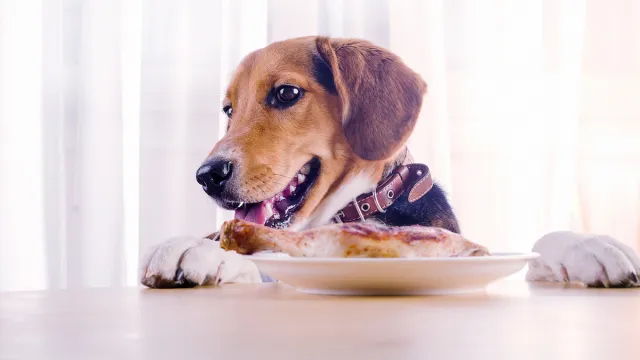
No matter how responsible of a pet parent you are, you still might mindlessly toss your dog a scrap of food from the table once in a while, assuming it’s safe for them to consume in moderation. But as hard as it can be to resist those adorable puppy eyes, you’ll want to think twice: According to veterinarians, there are many surprising foods that are toxic to dogs, even in small quantities. Keep reading to learn what’s on the no-feed list.
RELATED: Why You Should Never Stop Your Dog From Licking You.
What Foods Are Toxic to Dogs?
1. Peaches and cherries
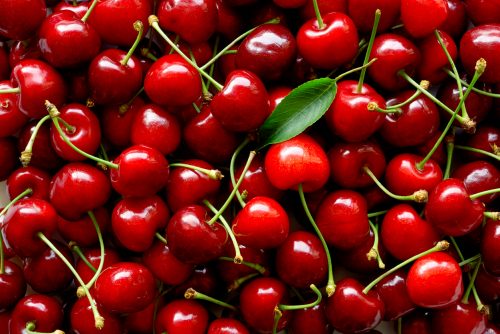
The good news: Peaches and cherries aren’t inherently toxic to dogs. “If your dog gets a pitted cherry or a slice or two of some peach, it should be fine,” says Matthew McCarthy, DVM, a veterinarian and founder of Juniper Valley Animal Hospital in Queens, New York.
However, these fruits’ pits, leaves, and stems are dangerous. “These parts, especially the pits, contain cyanogenic glycosides,” notes McCarthy.
When dogs chew on these parts, it releases cyanide, which interferes with their oxygen metabolism. “Dogs will have dilated pupils, bright red mucous membranes, panting, difficulty breathing, and go into shock,” says McCarthy.
There’s also the fact that if they don’t chew the pits, it could cause intestinal blockage.
2. Avocados
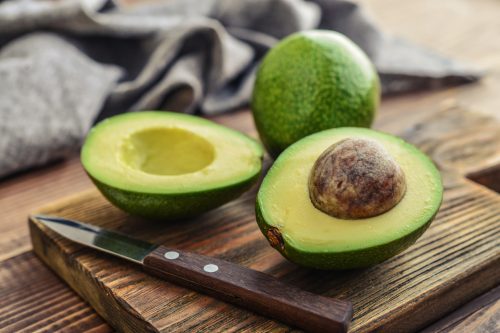
The American Kennel Club (AKC) notes that avocados contain persin, a fungicidal toxin, which can cause vomiting, diarrhea, and myocardial damage in dogs. The pit can also cause choking or an intestinal blockage.
3. Grapes and raisins
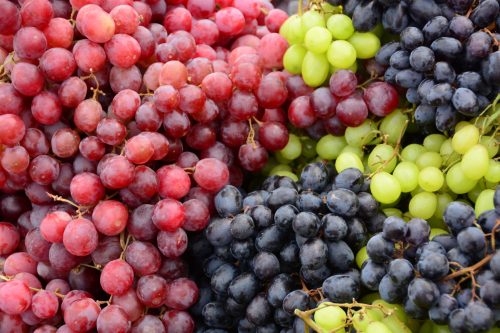
Though researchers still aren’t sure exactly why this fruit is toxic to dogs, Danielle Bernal, DVM staff veterinarian with Wellness Natural Pet Food, says grapes and raisins “can potentially lead to the rapid onset of kidney damage.”
Likewise, Nell Ostermeier, DVM, veterinarian and spokesperson with Figo Pet Insurance, said she’s even seen it lead to kidney failure.
RELATED: I’m a Veterinarian and These Are the 10 Things You’re Doing That Your Dog Hates.
4. Chocolate
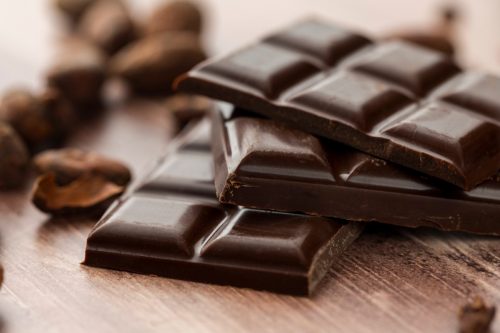
Ostermeier shares that chocolate, especially dark chocolate, contains methylxanthine, a compound that’s toxic to dogs and “can cause digestive upset, dehydration, restlessness and cardiac arrhythmias (abnormal heartbeats).”
Nick Horniman, MRCVS, veterinary surgeon and founder of online pet pharmacy MyPetsVet, notes that chocolate also contains theobromine and caffeine. “Dogs are unable to metabolize these stimulants effectively, leading to potentially severe symptoms like vomiting, rapid breathing, increased heart rate, and, in extreme cases, seizures,” he explains.
5. Coffee

The same compounds in chocolate that make dogs sick (methylxanthines) are also present in coffee—specifically, coffee grounds—as well as tea bags, soda, energy drinks, and diet pills.
“Dogs are more sensitive to caffeine than humans, and signs of an overdose are similar to those seen with chocolate toxicosis,” says Jo Myers, DVM, a veterinarian at pet telehealth company Vetster.
The Pet Poison Helpline notes that while one to two laps of coffee won’t do any major harm to your pet, a “moderate amount” can lead to serious symptoms and can even be fatal.
RELATED: I’m a Dog Trainer and I’d Never Own These 5 Breeds “Unless My Life Depended on It.”
6. Fatty bacon
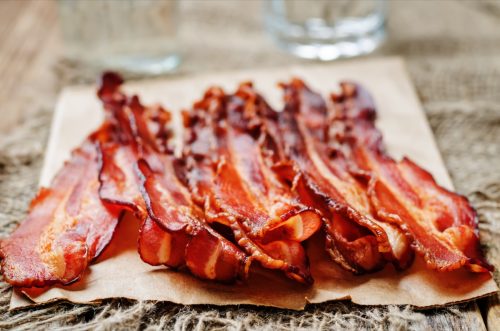
Dogs can enjoy the flavor of bacon through chew toys and safe treats, however they should not consume bacon itself. “Even in small amounts, [bacon] can cause gastrointestinal upsets and pancreatitis,” says Bernal.
It’s important to keep in mind that dogs are much smaller than humans—so a single slice of fatty bacon “is no small treat” for them, Bernal adds.
7. Macadamia nuts
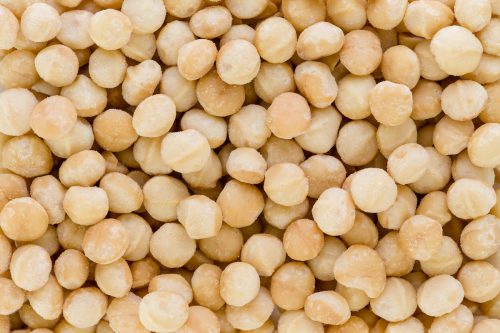
Lorna Winter, co-founder and head of the training program at Zigzag, says that macadamia nuts can be deadly to dogs. “The toxins in macadamias can affect your dog’s muscles and nervous, system resulting in weakness, swollen limbs, and panting,” she explains.
Purina also notes that black walnuts can be toxic to dogs (though they say regular, English walnuts are usually fine).
However, even though other nuts may not be toxic, the AKC points out that they can all pose a choking hazard and are very high in fat.
8. Onions and garlic
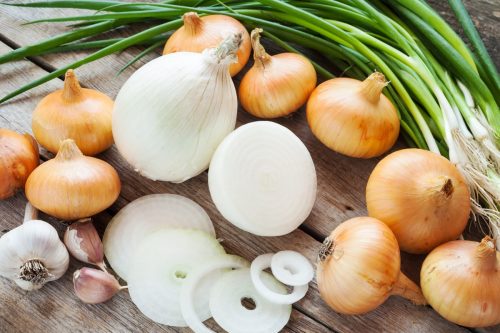
For dogs, onions and garlic are toxic in all forms: powdered, raw, dehydrated, or cooked, according to the experts at Protectivity. Other alliums like chives and leeks are also toxic.
“They pose a threat due to their thiosulfate content, which can damage red blood cells and lead to anemia in dogs,” explains Horniman.
“Symptoms appear gradually after several days and include lethargy, appetite loss, pale gums/tongue, and rapid breathing,” Myers adds.
RELATED: I’m a Vet and I’d Never Buy These 5 Things for My Dog.
9. Xylitol
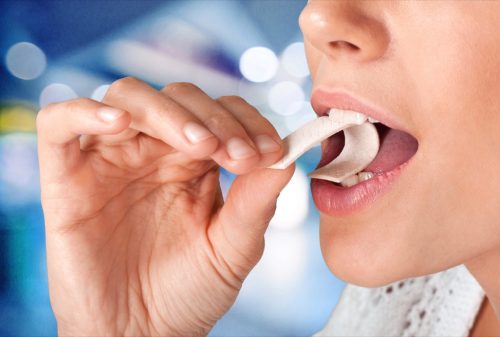
The sugar substitute Xylitol is found in foods like lollipops, chewing gum, mints, and sometimes peanut butter, and it’s highly toxic to dogs.
“Xylitol causes an abnormal elevation in insulin in dogs. This puts your dog at risk for hypoglycemia (low blood sugar),” says Ostermeier, who adds that this compound can also cause digestive upset, incoordination, lethargy, seizures, and liver damage.
10. Dairy products
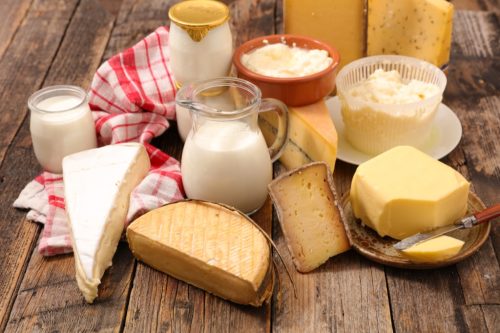
Dairy products aren’t technically toxic to dogs, but these foods and drinks can often pose serious problems.
Puppies rely on their mother’s milk to grow and thrive—and because of this, they produce an enzyme called lactase that helps them digest milk. However, as they age and no longer need it, dogs slowly produce less and less of this enzyme.
“Many dogs are lactose intolerant and will experience digestive problems if they consume dairy,” note the experts at Protectivity.
Though giving your dog a lick of your ice cream cone won’t prove fatal, it may upset their stomach.
11. Cooked meat bones
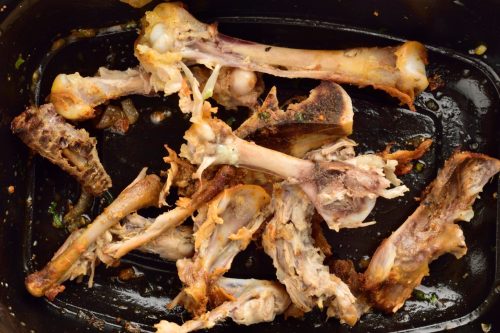
Again, leftover meat bones are not toxic per se, but “when they are no longer in a raw state, cooked bones are more likely to splinter as a dog chews them, creating a far greater risk of causing oral injury,” Bernal explains. Winter adds that brittle bones can cause digestive issues.
If your dog does ingest any of these toxic foods, it’s advisable to call your veterinarian or animal poison control immediately.
For more pet advice sent directly to your inbox, sign up for our daily newsletter.